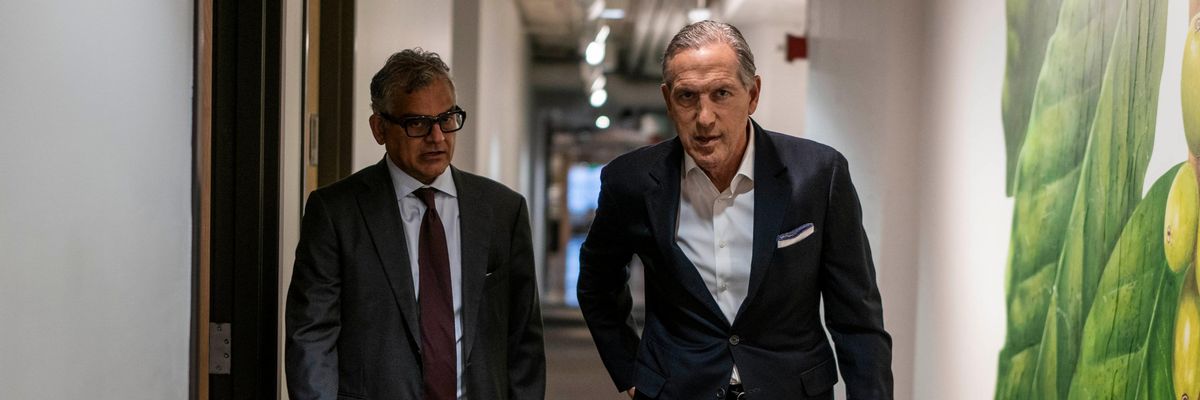At long last, Starbucks CEO Howard Schultz is being held to account for his company’s union-busting tactics.
Union members with Starbucks Workers United (SBWU) reacted with surprise, excitement, and a sense of vindication to the news that Schultz will be appearing under oath in front of a U.S. Senate committee on March 29. “[It’s] huge,” Boston-based barista Tyler Daguerre tells The Progressive. “We haven’t been able to get Howard to move like that.”
Under Schultz and other company leaders, Starbucks has engaged in anti-union attacks dating back to the 1980s, when they successfully pushed out a United Food and Commercial Workers (UFCW) union.
Since the current wave of unionization started roughly eighteen months ago, the company has retaliated through store closures, hours cuts, firings of pro-union workers, better benefits, raises for nonunion stores, and more.
In early March, a National Labor Relations Board (NLRB) administrative judge for the Buffalo region found that Starbucks had engaged in “egregious and widespread misconduct demonstrating a general disregard for the employees’ fundamental rights.”
When asked what they wanted to hear from Schultz when he testifies before the Senate committee on March 29, several baristas expressed frustration about the union-busting that the $115 billion company has engaged in. “Is this union-busting campaign against your partners worth the damage it has done to the legacy you claim to have built?” asks Alydia Claypool, a barista in Overland Park, Kansas.
“I would ask why he chose to make an example out of me and my coworkers through the retaliatory shutdown of our College Avenue store,” says Evan Sunshine, an SBWU member based in Ithaca, New York.
At least one barista was skeptical that Schultz would answer truthfully, even when questioned under oath. “The company has been consistently dishonest throughout this process,” says James Greene, a barista in Wilkins Township, Pennsylvania, near Pittsburgh. “I don’t see that changing anytime soon.”
Senator Bernie Sanders, Independent of Vermont, had been pressuring Schultz for weeks to testify at the Health, Education, Labor, and Pensions (HELP) committee that he chairs, having “invited” him to appear on Thursday, March 9.
When Schultz refused to appear, Sanders threatened to issue a subpoena. Finally, on March 7, with a vote on the issue looming the next day, Schultz gave in to the movement.
Just before he leaves the office of interim CEO, Schultz will finally be held to account for union-busting at the company under his tenure.
There are almost 300 unionized company-run Starbucks in the United States, and the company has yet to reach a contract with a single one, despite a legal requirement to bargain in good faith. “Starbucks strategy is quite clear; it is to stall, stall, stall,” said Sanders.
With Schultz agreeing to appear, Sanders and the HELP Committee abandoned their plan to vote on a subpoena on Wednesday. However, they did carry on with a hearing on the right to organize corporate union-busting.
At that session, Sanders and ranking Republican Bill Cassidy of Louisiana issued competing, clashing visions for what workers’ rights mean. As Sanders emphasized the right to organize without corporate anti-union attacks, Cassidy focused on opposition to the NLRB and argued for the so-called right to work—which allows non-union workers in union workplaces to opt out of paying costs of representation.
“There’s a class war going on whether we want to recognize it or not,” Sanders said.
Other major supporters of the Starbucks baristas and other workers also testified during the hearing.
“How many hundreds of thousands of baristas showed up for Starbucks in the middle of a pandemic?” AFL-CIO President Liz Shuler asked. She argued that corporate spending on anti-union consultants should not be legal or a tax write-off.
“Corporations have rigged the rules of our economy against working people,” said Service Employees International Union (SEIU) president Mary Kay Henry.
“It’s ridiculous that the future of tens of thousands of Starbucks workers is up to the whims of just one person, Howard Schultz,” Henry added. Starbucks Workers United’s parent union, Workers United, is an affiliate of SEIU.
“There are no meaningful consequences for [businessmen] like Howard Schultz when they break [the] law,” International Brotherhood of Teamsters president Sean O’Brien said at the hearing.
Though volumes of material in the past two weeks have confirmed extensive anti-union activities by Starbucks, some of the most poignant words about Schultz unsurprisingly came from a barista.
“It’s really disorienting to be shown you’re wrong and you’re actually hurting people and can bring up a lot of hard-to-deal-with stuff, internally,” said Bailey Fulton, an SBWU member in Worcester, Massachusetts.
“I hope that he can accept it enough to change his behaviors and views,” Fulton added, “because he’s just causing so many problems for so many people at this point and sabotaging everything he claims to uphold.”

